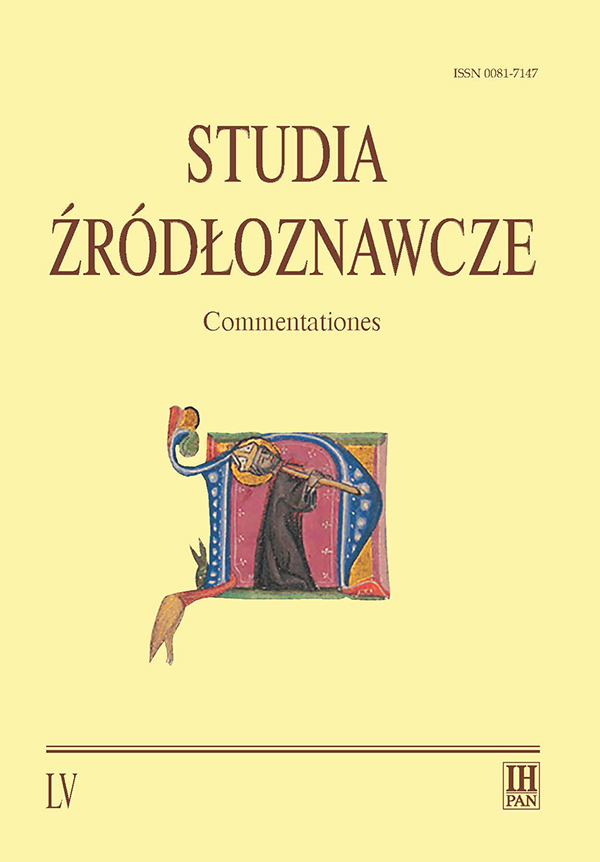Glossa biblijna jako problem badawczy
DOI:
https://doi.org/10.12775/SZ.2017.06Słowa kluczowe
Biblia rękopiśmienna, Glossa biblijna, biblistyka średniowieczna, transmisja tekstu, organizacja tekstu na stronie, historia nauki, historia szkolnictwa, manuscript Bible, Biblical gloss, medieval Biblical studies, textual transmission, page layoutAbstrakt
Biblical glossary as a research problem
The Biblical glossary is one of the most important phenomena in the history of medieval scholarship, it combines the text of the Scriptures with a commentary in a special graphic layout. It played an important part in the popularisation of the Biblical studies. The glossary appeared around the turn of the twelve century in northern France in the milieu of cathedral school at Laon, with the key figure of Master Anselm. Already before the mid-twelve century glosses to individual books of the Bible gained huge popularity, and had hundreds of copies. At a certain time – it is thought today that it was the early thirteenth century – the text of the Glossary got stabilised. And although in the thirteenth century its popularity began to fade, it was copied to the end of the medieval period, and then many times published in print.
Modern research into the glossary, although initiated in the nineteenth century, has in fact been developed in the 1980s. But ambitious source research and comparative analyses have shown that the Biblical glossary is a very difficult discipline. It was comparatively easy for researchers to have got through hagiographical legends that grew up around the glossary (for example the alleged authorship of Walafrid Strabon), but despite all the efforts only one book (Song of Songs) and some other fragments were published in a critical edition. In the course of ongoing studies more and more apparently “sure” points in our knowledge about the glossary are discredited, such as, for instance, the conviction that the glossary text had stabilised at one point of time. What hampers the research is mainly an enormous number of manuscript copies containing glosses, amounting to thousands of them. What is more, the production of those manuscripts was strictly standardised, making it difficult to establish not only their actual chronology, but also their place of origin. The research into the Biblical glossary is still a growing field of study.
Bibliografia
Blic J. de, L’oeuvre exégétique de Walafrid Strabon et la Glossa Ordinaria, „Recherches de théologie ancienne et médiévale”, 16, 1949, s. 5–28
Froehlich K., An Extraordinary Achievement. The Glossa Ordinaria in Print, w: tenże, Biblical Interpretation from the Church Fathers to the Reformation, cz. 5, Variorum Collected Studies Series, 951, Farnham 2010, s. 15–21
Froehlich K., Makers and Takers. The Shaping of the Biblical Glossa Ordinaria, w: tenże, Biblical Interpretation from the Church Fathers to the Reformation, cz. 3, Variorum Collected Studies Series, 951, Farnham 2010, s. 1–19
Froehlich K., Walafrid Strabo and the Glossa Ordinaria. The Making of a Myth, „Studia Patristica”, 28, 1993, s. 192–196
Froehlich K., Gibson M.T., Introduction, w: M.T. Gibson, “The Glossed Bible”, Biblia latina cum glossa ordinaria. Facsimile reprint of the editio princeps: Adolph Rusch of Strassburg 1480/81, Turnhout 1992
Gibson M.T., The Place of the Glossa Ordinaria in Medieval Exegesis, w: Ad litteram. Authoritative Texts and their Medieval Readers, red. M.D. Jordan, K. Emery Jr., Notre Dame 1992, s. 5–27
Gibson M.T., The Twelfth-Century Glossed Bible, „Studia Patristica”, 23, 1989, s. 232–244
Glossa Ordinaria Pars 22: in Canticum Canticorum, red. M. Dove, Brepols 1997
Grafton A., Worlds Made by Words. Scholarship and Community in the Modern West, Cambridge (MA) 2011
Gross-Diaz T., The Psalms Commentary of Gilbert of Poitiers. From Lectio Divina to the Lecture Room, Leiden–New York 1996
Hamel Ch. de, Glossed Books of the Bible and the Origins of the Paris Booktrade, Woodbridge 1984
Light L., Versions et révisions du texte biblique, w: Le Moyen Âge et la Bible, red. P. Riché, G. Lobrichon, Paris 1984, s. 55–93
Lobrichon G., Une nouveauté: les gloses de la Bible, w: Le Moyen Âge et la Bible, red. P. Riché, G. Lobrichon, Paris 1984, s. 95–114
Matter E.A., The Church Fathers and the Glossa Ordinaria, w: The Reception of the Church Fathers in the West from the Carolingians to the Maurists, red. I. Backus, Leiden–New York 1997, s. 83–111
Salomon D.A., An Introdyction to the Glossa Ordinaria as Medieval Hypertext, Cardiff 2012
Signer M.A., The Glossa Ordinaria and the Transmission of Mediaeval Anti-Judaism, w: A Distinct Voice. Medieval Studies in Honor of Leonard E. Boyle OP, red. J. Brown, W.P. Stoneman, Notre Dame 1977, s. 591–605
Simon M., La glose de lʼÉpitre aux Romains de Gilbert de la Porrée, „Revue dʼhistoire ecclésiastque”, 52, 1957, s. 95–114
Smalley B., Gilbertus Universalis, Bishop of London (1128–34) and the Problem of the Glossa Ordinaria, „Recherches de théologie ancienne et médiévale”, 7, 1935, s. 235–262; 8, 1936, s. 24–60
Smalley B., La Glossa Ordinaria: quelques prédécesseurs d’Anselme de Laon, „Recherches de théologie ancienne et médiévale”, 9, 1937
Smalley B., Glossa ordinaria, w: Theologische Realenzyklopädie, t. 13, red. G. Müller, 1984, s. 452–457
Smith L., The Glossa Ordinaria. The Making of a Medieval Bible Commentary, Leiden–Boston 2009
Smith L., The Glossed Bible, w: The New Cambridge History of the Bible, t. 2: From 600 to 1450, red. R. Marsden, E.A. Matter, Cambridge 2012, s. 363–379
Stirnemann P., Où ont été fabriqués les livres de la glose ordinaire dans la première moitié du XIIe siècle, w: Le XIIe siècle. Méditations et renouveau en France dans la première moitié du XIIe siècle, red. F. Gasspari, Cahiers du Léopard dʼOr, t. 3, Paris 1994, s. 257–301
Wielgus S., Badania nad Biblią w starożytności i w średniowieczu, Lublin 1990 Projekt Glossae.net – http://glossae.net/en/content/glossaenet
Pobrania
Opublikowane
Jak cytować
Numer
Dział
Statystyki
Liczba wyświetleń i pobrań: 529
Liczba cytowań: 0



